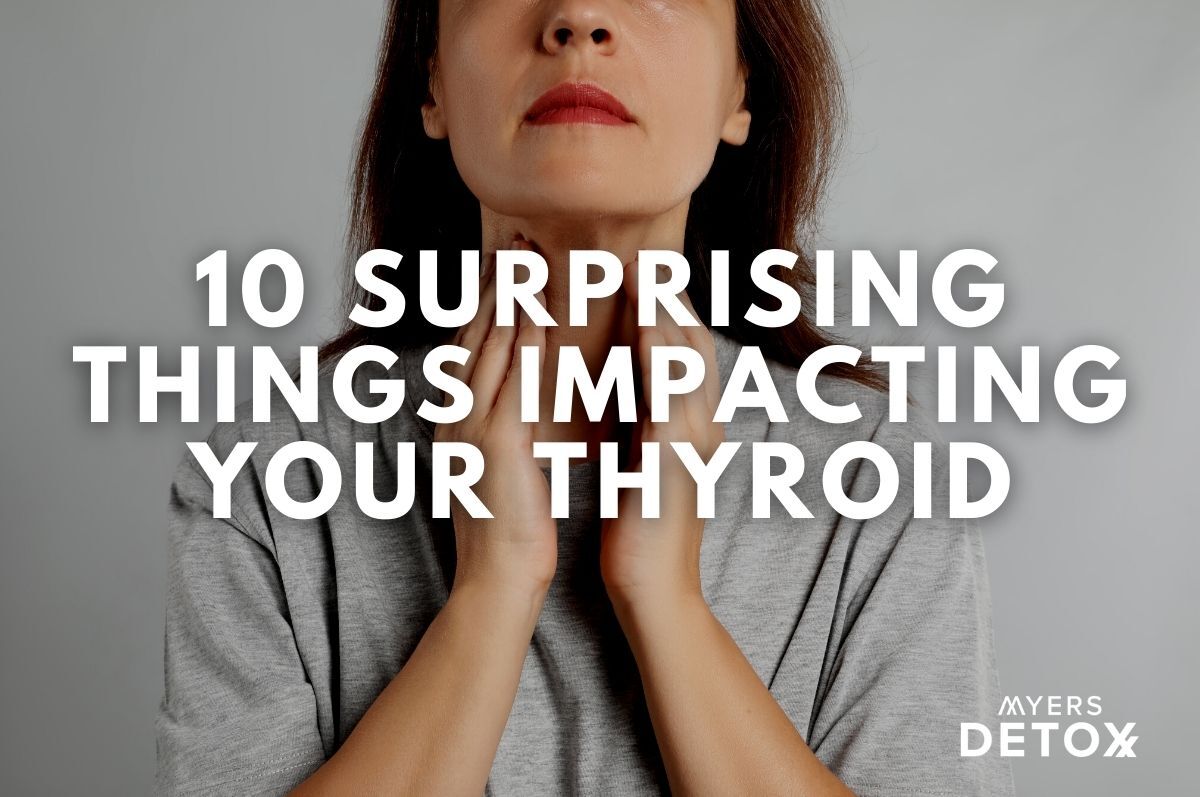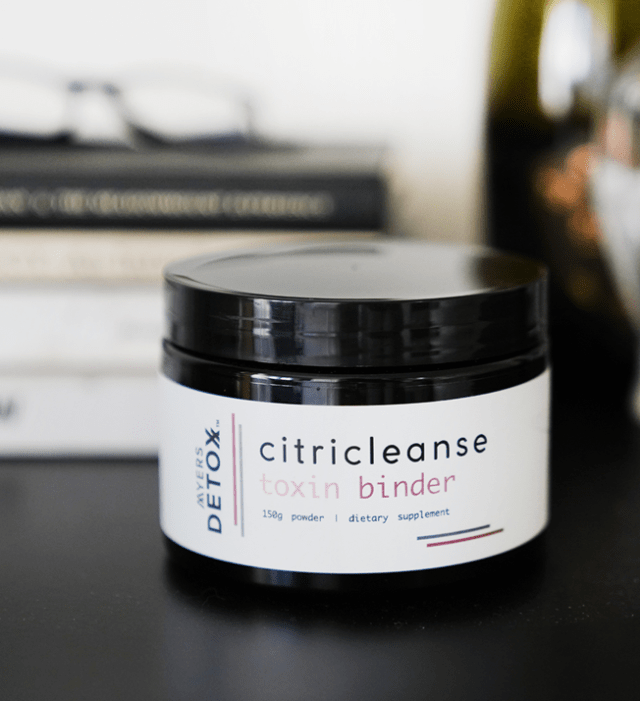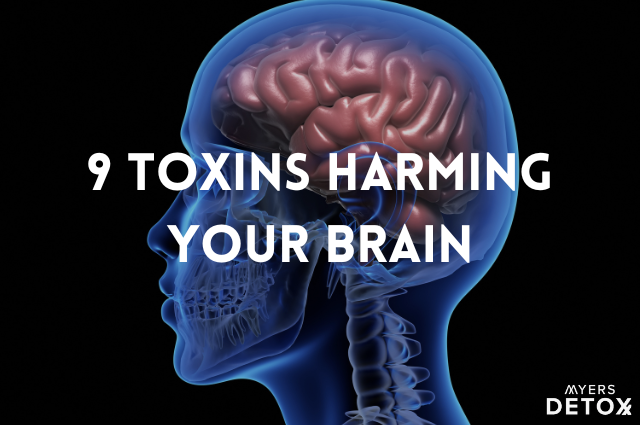Anyone with thyroid problems should read this article. If you have trouble losing weight or feel depressed or tired, it could be your thyroid. The thyroid sets your metabolism and energy level.
Learn how to detect reduced thyroid function, the causes of thyroid problems, and how to heal your thyroid.
Your thyroid is like a thermostat for your metabolism. Just like your thermostat controls the temperature of your home, your thyroid controls the speed of your metabolism.
You can do all the dieting and exercise in the world, but you won’t lose weight unless your thyroid is functioning properly. Perhaps you eat normally. Like me, you cut the carbs, eat plenty of protein, eat your veggies, but the scale doesn’t budge. Your thyroid may be the culprit! In fact, you may chronically undereat, because moderate eating, even combined with exercise, has resulted in weight gain.
When I looked into the research on this, I found that fully half of people entering formal weight loss programs do not overeat. The dropout rate for these programs run as high as 85 percent, partly because so many dieters cannot lose weight just by cutting calories. Low calorie dieting shuts down thyroid function, causing calories to be stored rather than burned. For most of you, dieting makes an already sluggish thyroid even more sluggish. Identifying and correcting a low-functioning thyroid can make all the difference.
What is the Thyroid?
This remarkable gland in the neck affects every cell in your body, regulating cell metabolism like a thermostat. Your body needs a constant level of heat to perform its functions. There’s a huge difference in how your cells function, depending on whether they are cold or warm.
Yur thyroid releases hormones that tell your body to burn fat as fuel, instead of storing them as extra pounds. By doing this, your thyroid can actually increase your base metabolic rate — which allows you to burn fat even while you’re relaxing or asleep.
When your thyroid function is low (what is called a ‘sluggish’ thyroid or hypothyroid), it doesn’t produce enough active hormones, your own immune system is fighting your thyroid or something is preventing the hormones from getting into cells, so your whole system slows down. And that is the way you tend to feel if your thyroid is not able to do its job well. Receptors for thyroid hormone are found throughout the body, and disturbance in thyroid functioning can cause problems in almost every system of the body from the heart and GI tract and blood pressure to sleep, mood, even the growth of hair, skin and nails.
Common Thyroid Problems
Thyroid imbalance and disease is one of the most common conditions in the Western world today. Thyroid problems are worse in women. Common types of thyroid imbalances include:
- Hypothyroidism or underactive thyroid
- Hashimoto’s thyroiditis, an autoimmune condition that attacks the thyroid
- Grave’s disease or hyperthyroidism, overactive thyroid
- Thyroid nodules, benign growths on the thyroid
- Goiters, swelling of the thyroid gland (see photo)
All of the conditions above can usually be handled better with natural methods of care than with regular medical treatments. The only time that hormone therapy is needed is if one has absolutely no thyroid gland left due to surgery or radioactive iodine treatments. Your thyroid can be completely healed and restored to normal function. In almost all cases, thyroid hormone replacement therapy may give symptomatic relief, but it will impair complete healing of your thyroid.
Symptoms of Thyroid Dysfunction
Symptoms of low thyroid often develop gradually and can sometimes take years to manifest. If you suspect you may have a thyroid problem, look at your symptoms and your history carefully, yourself. Nothing is more important than your own sense about how our own body is working — or not working. You always want to look at symptoms of thyroid problems, instead of relying only on tests, as most medical doctors do. You can’t always rely on tests because they are not sensitive or comprehensive enough to diagnose everyone’s thyroid issues.
The thyroid can become sluggish in many ways, many of which will not show up on tests your doctor performs. Just because your tests are normal does not mean much. If symptoms strongly suggest there is a thyroid problem, you should ignore negative test results and treat your thyroid.
Symptoms and Risk Factors
- Uncomfortably heavy since childhood
- Family history of thyroid problems
- As a child, played quietly rather than vigorously
- Weight gain began when you got your period, had a miscarriage, gave birth, or began menopause
- Low energy, fatigue, need lots of sleep (more than 8 hours), trouble getting going in the morning
- Tendency to feel cold, particularly in the hands and feet
- Tendency toward excessive weight gain or inability to lose weight
- Hoarseness, gravelly voice
- Constipation
- Depression, including postpartum
- Low blood pressure
- Low heart rate
- Reduced sex drive
- Poor concentration and memory
- Swollen eyelids and face, general water retention
- Cellulite formation
- Thinning or loss of outside of eyebrows
- Weak, brittle nails
- Coarse, dry hair
- Hair loss
- Tend to have a low temperature (under 97.8)
- Headaches (including migraines)
- High cholesterol
- Lump in throat, trouble swallowing (e.g. pills)
- Goiter; enlarged, swollen, or lumpy thyroid (look at the base of your throat, below your Adam’s apple)
- Infertility, impotence
- Fibrous or fibrocystic breasts
- Development of ovarian cysts
- Menstrual problems, including excessive bleeding, severe cramping, irregular periods, severe PMS, scanty flow; early or late onset of first period; premature cessation of menstruation (amenorrhea)
Symptoms more Common in Menopausal or Older Women
Menopause symptoms and thyroid symptoms overlap. Don’t let your doctor dismiss your thyroid symptoms as menopause. Investigate.
- Pale skin
- Hypoglycemia
- Hair loss
- Labored, difficult breathing
- Swollen feet
- Nervousness, anxiety, panic
- Enlarged heart
- Premature graying
- Gallbladder pain
- Pain in joints
- Angina
- Heart palpitation, irregular heartbeat
- Muscle weakness
- Atherosclerosis (hardening of the arteries)
- Strong-smelling urine
- Tongue feels thick
- Vision and eye problems
- Excess ear wax
Causes of Thyroid Dysfunction
For most people, there is more than one trigger for low thyroid function.
Genetics. You have relatives that have thyroid problems.
Low-Calorie Dieting and Nutrient-Deficient Diets. Within hours of restricting calories, the thyroid will slow down and remain slow until the ordeal (the famine, the diet) is over. Many dieters suffer a metabolic decline that never ends until the condition is treated. For them, the permanent slowdown of calorie burning results in the familiar post-diet rebound weight gain.
Hormonal Events. Hormonal events throw many vulnerable people into low-thyroid states. Even if you passed through puberty normally, a miscarriage, abortion, or pregnancy may have depressed your thyroid function. The final hormonal trigger, menopause, is often confused with low thyroid function, as symptoms look very similar.
Chemicals in Water. The water supply is loaded with halogens like fluoride, chlorine, and bromine, which compete with iodine for absorption in our bodies and suppress thyroid function. Perhaps this is why so many people seem to have low thyroid symptoms; most water supplies are treated with fluoride and chlorine. Every time you take a shower, your skin absorbs both these chemicals. Get a shower or whole house filter. Every time you swim in a pool or jacuzzi, you absorb chlorine or bromine. Drink spring water or be sure your water filter removes chlorine, fluoride and hydrocarbons (another thyroid suppressor). Time to switch to fluoride free toothpaste! To remove chemicals, I recommend a PureEffects Water Filter.
Excess Estrogen. Increased estrogen and progesterone bind to thyroid hormones, preventing them from being used by the body. A common cause of thyroid problems is increased estrogen due to birth control pills. Excess estrogens in the body can also be caused by poor liver function or break down of estrogens and excess body fat (which actively produces estrogen). Even if you have low estrogen levels, you can be plagued with estrogen-mimicking substances that block thyroid hormones. For a complete list of estrogenic substances to avoid, see my blog Estrogen Dominance Syndrome.
Copper and Mercury Toxicity. Copper and mercury interfere with the thyroid by antagonizing or opposing zinc, manganese and selenium needed for thyroid function. Unfortunately, copper and mercury toxicity are almost universal today. Mercury gets into our bodies from dental fillings, fish except small ones like sardines, and the burning of coal, which releases mercury in the air. To learn more, read Mercury Toxicity. Copper toxicity can be due to adrenal insufficiency, vegetarian diets, zinc deficiency, stress, etc. To learn more, read Copper Toxicity Syndrome. Listen to this podcast on Copper Dysregulation.
Nutrient Deficiencies. These include low levels in our food of bioavailable zinc, selenium, iodine, manganese and others needed for proper thyroid functioning. The thyroid also needs protein, though many people don’t eat enough.
Parasites. Parasites can exacerbate thyroid problems. You can do Infrared Saunas to kill them, as parasites can’t stand the heat. When the body is nourished and detoxed, parasites cannot survive. This method treats the host by making them healthier, rather than just treating the parasite. If the host is not healthy, a parasite can be very hard to kill, even taking years. You can get rid of parasites with an amazing supplement called GB-3 and doing infrared saunas.
Vegetarian Diets. Eating a vegetarian diet can cause you to become anemic or iron deficient, needed for vigorous thyroid function, along with other nutrients such as selenium and zinc. These nutrients are found plentifully in red meat but are more difficult to get from foods on a vegetarian eating plan, especially if you are vegan (no animal products). I advise eating red meat once a week for healthy thyroid function.
Soy. Soy can have a powerfully negative effect on your thyroid, actually inhibiting its ability to produce its primary hormone, T4. Soy is in all fast food and most processed foods. If you are having a lot of soy milk, edamame, tofu, soy burgers, soy shakes, soy bars or you’ve started on a diet program where the meal replacement shakes/bars/snacks use soy as their protein source, you may want to reconsider. For more information, see my article Little Known Dangers of Soy.
Goitrogens. Goitrogenic foods (members of the cabbage family) contain thiocyanates, which inhibit thyroid function. Cooking only destroys this compound in goitrogenic foods to a degree. These include Chinese cabbage, broccoli, watercress, kale, rutabaga, turnips, brussel sprouts, cauliflower, radish, horseradish, kohlrabi, collard, rape and mustard greens. Millet is the most goitrogenic food on earth. Beware of it in gluten-free products. They beauty is that you don’t have to worry about avoiding goitrogenic foods as long as you have sufficient iodine in your diet. Goitrogens only present a problem to your thyroid in the absence of sufficient iodine.
Iodine. Our thyroid hormones are composed of tyrosine (an amino acid, protein building block) and iodine. Tyrosine is easy to find in all animal, and in many vegetable, protein sources. Iodine is harder to find. So, the government began iodizing salt to prevent goiter (caused by too little iodine). As a result, autoimmune thyroiditis, aka Hashimoto’s (caused by too much iodine), became epidemic. Too much iodine can also cause hyperthyroidism. One quarter of men and up to half of women are iodine deficient. If you squirm at the thought of eating fish or seaweed, Hain makes iodized sea salt or you can take Oregon’s Wild Harvest Kelp, a food-based form of iodine. Many need three tablets a day. However, I do not recommend ever taking pure iodine supplements as these can build up to toxic levels. Not all the iodine in the kelp supplements are absorbed so you are getting much less than what is stated on the bottle. You must also figure in all the iodine that is blocked in your system by halogens like fluoride, chlorine and bromine. We are constantly bombarded with these iodine blockers, so you need to ingest far more than the recommended 150 mcg per day to account for this effect.
Salt. What kind of salt should you use? One-quarter teaspoon of iodized salt delivers 130 micrograms. The daily minimum requirement of iodine for survival is 150 micrograms. Sea salt contains many minerals (about 100), but almost no iodine, while iodized salt has been stripped of all minerals (except sodium chloride). So, if you use sea salt, be sure to eat plenty of fish and seaweed.
Intolerance to Gluten. Wheat, rye, and barley contain a thyroid-irritating substance called gluten. Gluten intolerance is a common cause of Hashimoto’s, an autoimmune condition that often clears up when victims stop eating breads, pastas, pastries, etc. Many people achieve normalization of their thyroid function when adopting a gluten-free diet. For more information, see my article Gluten Sensitivity Affects 1 in 3. If you have thyroid or gluten issues, I recommend taking gluten digesting enzymes called Glutenza.
Excessive Stimulant Use. Many stimulants such as sugar, caffeine, cocaine and others temporarily increase thyroid activity. However, when the stimulant dose wears off, a rebound action causes lowered thyroid activity. Reduced thyroid function and adrenal fatigue (which negatively impacts the thyroid) can happen if you abuse stimulants for too long.
Prescription Drugs. Estrogen (including the estrogen in birth control pills) and lithium are well known thyroid-inhibiting drugs. Sulfa drugs and antidiabetic drugs also slow thyroid function. Prozac is full of fluoride, another thyroid inhibiting substance. There are many thyroid inhibiting medications too numerous to list.
Stress. Stress weakens the thyroid gland. The stress can be physical, emotional, financial, or other.
Tension in the Neck. Tension can overstimulate or irritate the nerves going to the thyroid gland. One must release the tension on the nerves leading to the thyroid that are in the neck and cervical spine area. This can be accomplished with Reiki or other healing modalities.
Injury. Head injuries often adversely affect the thyroid. Whiplash, which affects the throat, often seems to affect thyroid function.
Thyroid Malfunction 101
Problems can occur at any stage of the production, release, conversion or utilization of thyroid hormone. Thyroid gland metabolism involves many steps, all of which must work properly. Here I offer you a broad view of the problems that can interfere in your thyroid function:
The Pituitary Gland must Secrete the Right Amount of TSH or Thyroid Stimulating Hormone. This causes the thyroid to secrete thyroxine, T4. T4, tetra-iodothyronine, consists of the amino acid tyrosine plus four iodine molecules. It is the primary hormone manufactured by the thyroid gland. Sixteen percent of T4 is used directly by the cells. The rest is converted into its sister hormone T3.
Hormone Production in the Thyroid Gland. T4 production requires manganese, iodine, selenium, tyrosine, vitamins C and B-complex, and many other micronutrients that are low in our food today. If you eat poor quality food, raw food except dairy products, refined foods, or a vegetarian diet, you will not get enough nutrients to supply the thyroid with all its nutritional needs to make thyroid hormones.
Conversion of T4 to T3. T3, tri-iodothyronine, consists of the amino acid tyrosine plus three iodine molecules. It has the greatest effect on the body’s metabolic function. Once inside the cells, thyroxine, T4 must be converted to T3, a more active form of the hormone. Many people are unable to perform this conversion due to nutrient deficiencies.
Absorption Into the Cells. T4 must be absorbed into the cells to be utilized. For this to occur, the cell membranes must function properly. Accumulation of biounavailable calcium and magnesium reduce cell permeability. Oxidative stress from lack of antioxidants or a deficiency of omega-3 fatty acids can also block absorption of T4. Copper affects absorption by altering calcium and potassium levels. Cadmium or nickel toxicity affect hormone absorption by influencing levels of calcium, sodium and other critical minerals.
Utilization in the Mitochondria. The mitochondria are the energy production powerhouses of the cells. Any problem with them and you’ll have low energy and low metabolism. Potassium plays a role in sensitizing the mitochondria to thyroid hormone. Without this, the mitochondria simply do not respond to thyroid hormones. The mitochondria, however, also require many nutrients such as B-complex vitamins, iron, copper and many others to produce ATP (adenosine triphosphate). ATP is like refined gasoline that our bodies use for fuel. If any nutrients are deficient, or toxins block critical steps in the energy production pathways, thyroid hormones or hormone replacement will be ineffective in increasing energy production. This is why some people will find that their tests come out normal or they take thyroid meds and they don’t work.
Infection in the Thyroid. Hashimoto’s, an autoimmune condition, is the term used to describe when your body’s own immune system is attacking your thyroid. Many experts believe this is the reason for the majority of low thyroid function. If not corrected, it can result in the complete destruction of the thyroid, requiring medication for life. Testing for thyroid antibodies easily indicates Hashimoto’s. Some believe this is merely an infection in the thyroid the body is trying to kill, but in effect harms the thyroid in the process.
Poor Binding of Thyroid Hormone. Another reason for low thyroid symptoms is poor binding of T3 to protein complexes inside cells. These protein complexes have three parts. If any one of these parts is missing, then the complex cannot be made. They consist of Vitamin A, Vitamin D and cortisol. A deficiency in any of these items can cause low thyroid symptoms. Cortisol is made by the adrenal glands, illustrating why low adrenal function affects thyroid function.
Excess Binding of Thyroid Hormone. Thyroid hormones are ‘free’ or bound to proteins. When the majority of thyroid hormones are bound and cannot get into cells, a person will experience low thyroid symptoms. Estrogen is a common binder of thyroid hormones. A vast number of people have what is called estrogen dominance due to numerous estrogenic substances in our environment — even if testing shows they have low estrogen (e.g. menopausal women). For more information on how to reduce estrogen levels and estrogen-mimicking substances that bind thyroid hormones, read my article Estrogen Dominance Syndrome.
Inadequate Circulation to the Thyroid Gland. Good circulation allows nutrients and TSH into the thyroid. Tension in the neck area can impair circulation to the thyroid area. Chiropractic, inverted yoga postures, postural work, Rolfing, and other types of body therapies can correct this. Stress reduction is important.
The Adrenal Link. The adrenal glands manage your stress response by releasing adrenaline, cortisol and other hormones when you’re stressed. Too much stress can lead to adrenal fatigue. Because adrenal fatigue can reduce thyroid function, it is crucial to test your adrenals as well as your thyroid. The adrenals and thyroid work as a team. If the adrenals become overactive during chronic stress, the thyroid may slow down to try to calm the system. If the thyroid fails, the adrenals can get overworked and run down. If you have thyroid problems, but hormone treatment isn’t working, your adrenals may be exhausted. See my article Epidemic Adrenal Fatigue to learn ways to heal your adrenals. Unless both the thyroid and adrenals are functioning well, your energy, weight, and general health cannot be optimal.
Diagnosis and Treatment
I am going to cover all the ways in which thyroid treatment is approached so that you can see the weaknesses and strengths of diagnosis and treatment in each modality. Choose the method you are most comfortable with.
The most common test for thyroid function in conventional western medicine is the TSH (thyroid-stimulating hormone) test. The TSH measures the thyroid-stimulating hormone sent by the pituitary gland, which communicates to the thyroid gland how much thyroid hormones the body needs at any given time. The ideal range is 1-2. Levels greater than 2 indicate that the body needs more thyroid hormone. However, many doctors don’t believe in treating a thyroid issues until the levels reach 5-6, considering it ‘subclinical.’ So, you walk out of the office being told your tests were normal.
Since many thyroid problems are caused by reasons other than lack of TSH, your doctor will miss it. Often T3 and T4 are normal. High TSH is a better indicator, but most doctors do not know what to do with it provided the T3 and T4 are normal. Giving more thyroid hormones is not indicated here. Too often, doctors tell patients their thyroid tests are normal.
Once a doctor has finally diagnosed you, he will prescribe a synthetic T4 hormone replacement therapy with common brand names including Synthroid, Levothroid, Levoxyl, or Euthyrox. This may work for some people, but is an overly simplistic approach, as many thyroid issues do not resolve with just supplementing this one hormone. If these medications are ineffective, he may suggest a synthetic T3 like Cytomel.
The body almost always responds better to natural hormone therapy. This should always be tried first, though some do better on synthetics, like people with Hashimoto’s. Conventional medicine also maintains the premise that once hormone replacement therapy begins, the thyroid will stop producing hormones and replacement must be continued for life. While the thyroid will reduce hormone production, as the body knows they are not needed when you supplement, you do not have to take medication for life. Modern medicine simply does not provide a solution to heal the thyroid.
Holistic Medicine
A naturopathic physician, doctor of osteopathy, or very good holistic physician or endocrinologist, is more likely to run a full battery of tests, including free T4, free T3, reverse T3, and antithyroglobuin and antimicrosomal antibodies (signaling an autoimmune thyroid dysfunction). While this is certainly more thorough, it does not cover all the bases. Thyroid physiology is very complex. Just measuring the serum levels of T3, T4 and TSH, and perhaps thyroid antibodies is just touching the surface of the problem and wholly inadequate.
Your naturopath or progressive doctor will recommend taking a natural thyroid replacement hormone, derived from pig hormones. Pigs have the most humanlike thyroid glands. Brands include Armourthroid, Westhroid, Naturethroid (I like this one the best), and Thyrolar (contains artificial food coloring). These typically include T4 and T3 hormones, but also have the added benefit of containing T2 and T1 like your own thyroid produces. The natural products contain many nutrients like iodine, selenium and other minerals vital for thyroid activity.
As everyone has different physiology and different thyroid problems, these will work for most people, but not all. Be patient with thyroid medications. Finding the right medicine or combination and dose takes time and care. Some people feel better within days; others take months to find the right dose or combination. Hormone replacement can reduce symptoms, but does not address or heal the cause of your thyroid malfunction. Additionally, one’s one thyroid begins making less and less thyroid hormones because it doesn’t need to since you’re supplementing. This can result in you having to increase your medication over time. Problems with taking thyroid replacement hormones of any kind, natural or synthetic, include:
- Hormone therapies do nothing to improve the conversion of T4 to T3. However, one can supplement with T3 hormones if this is the problem.
- They do not assist passage of thyroid hormone through the cell membrane.
- They do not assist the absorption of T3 into the mitochondria.
- They do not assist the normal production of ATP in the mitochondria, which require many nutrients.
- They do not assist the body to “burn” or utilize ATP, the molecule the body uses to produce energy.
- They do not address excess estrogen in the body.
- A poor diet can offset the effects of hormones.
- Overwhelming stress can offset the effects of hormones.
- Hormone replacement completely mixes up the delicate feedback system that regulates pituitary TSH production, thyroid hormone synthesis, and all the other steps in this complex process.
- Without adequate mineral supplementation, too much thyroid medication over a long period can demineralize your bones.
- Common adverse symptoms include a wired, agitated feeling, heart palpitations, sleep disturbances, feeling hot, and diarrhea.
- Allergic to corn? Do not take Armourthroid.
- Allergic to milk? Do not take Synthroid.
Detox from Toxic Living
If you have thyroid issues already, even subclinically, it’s possible your body is straining under the weight of a heavy toxic burden.
Your thyroid is extremely sensitive to environmental toxins, especially heavy metals. And so, one of the best ways to support and protect your thyroid is by reducing your exposure to health-harming contaminants and by detoxing.
To help your body clear out those toxins and make space for healthy, vital cellular function.
Detoxing heavy metals can be a bit tricky for a couple of reasons:
- Heavy metals can lodge into your cells and tissues and can be challenging to release.
- Once they are released from your tissues, you need to make sure they exit your body as quickly as possible so they don’t re-lodge and cause more damage elsewhere.
To help your body clear out those toxins naturally, I created CitriCleanse.
CitriCleanse is a toxin binder that’s formulated to assist with all phases of your body’s natural release and elimination of contaminants like heavy metals and helps ensure that they are flushed out normally.
With just three high-quality ingredients, CitriCleanse helps your body’s natural detox mechanisms extract pollutants from your cells, gently surround them for removal, and then support the body’s elimination process.
The ingredients include:
- Fulvic and humic acid – rich in minerals that help to push metals out of the body
- Cilantro extract – supports liver function and specifically targets heavy metals like lead, mercury, arsenic, copper, aluminum, and more.
- Grapefruit pectin – Binds heavy metals and supports digestion and elimination
With the help of CitriCleanse, your body can gently release and transport impurities so that they are prevented from being reabsorbed or redistributed elsewhere in your system, thus mitigating the accumulation of further toxicity.
If you’re already managing thyroid issues or are concerned about developing one, you can’t overlook the role that heavy metals and other environmental contaminants could play in your imbalance.
Takeaway
I can tell you from personal experience that improving your thyroidfunction is one of the best things you’ll ever do for your health and life. Because when your thyroid is healthy, you can see and feel it all over your body. I hope this article supplied you with tips to help you support the health of this delicate and important gland.
*These statements have not been reviewed by the FDA. CitriCleanse is a dietary supplement and is not intended to diagnose, treat, cure, or prevent any disease. It is not intended to replace any medication or healing modality prescribed by your medical doctor. Please consult with your doctor before beginning a new supplement regimen.










